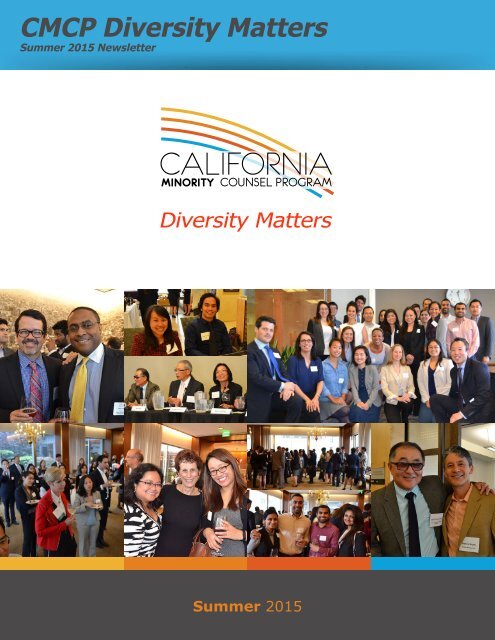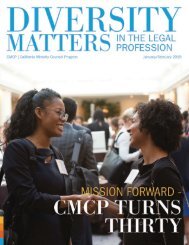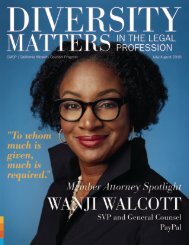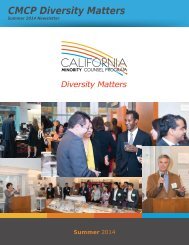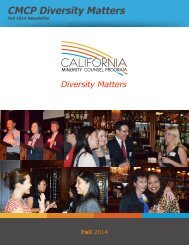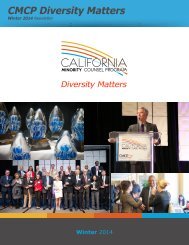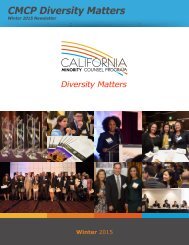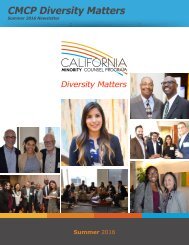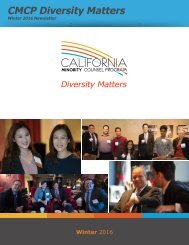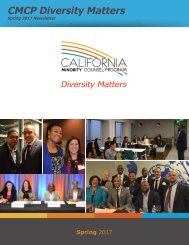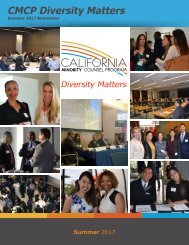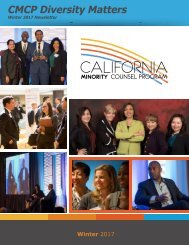Summer 2015
California Minority Counsel Program Diversity Matters eNewsletter Summer 2015 Issue
California Minority Counsel Program Diversity Matters eNewsletter Summer 2015 Issue
Create successful ePaper yourself
Turn your PDF publications into a flip-book with our unique Google optimized e-Paper software.
CMCP Diversity Matters<br />
<strong>Summer</strong> <strong>2015</strong> Newsletter<br />
MINORITY<br />
<strong>Summer</strong> <strong>2015</strong><br />
1
CMCP Diversity Matters<br />
<strong>2015</strong> eNewsletter Committee Members<br />
Tambry L. Bradford<br />
(Co-Chair)<br />
Special Counsel<br />
Pepper Hamilton LLP<br />
Cassandra Mougin<br />
(Co-Chair)<br />
Shareholder<br />
Pettit Kohn Ingrassia & Lutz, PC<br />
Michael Chung<br />
Of Counsel<br />
Willenken Wilson Loh &<br />
Delgado LLP<br />
Karen A. Henry<br />
Counsel<br />
Davis Wright Tremaine LLP<br />
Noah Perez-Silverman<br />
Associate<br />
Caldwell Leslie & Proctor, PC<br />
Kelly Perigoe<br />
Associate<br />
Caldwell Leslie & Proctor, PC<br />
David Shimkin<br />
Member<br />
Cozen O’Connor<br />
Jonathan M. Turner<br />
Partner<br />
Epstein Turner Weiss<br />
1
<strong>Summer</strong> <strong>2015</strong> Newsletter<br />
Table of Contents<br />
page 3<br />
page 4<br />
page 7<br />
Meet Your New CMCP Board Members –<br />
Attorney Spotlights Series Spotlight:<br />
Camilo Echavarria<br />
A Tale Of Two Public Entities:<br />
What Employers Can Learn About<br />
The Feha Accommodation Process<br />
Business Development Series:<br />
Is it Time for a Mid-Year Correction?<br />
page 9<br />
page 11<br />
page 14<br />
page 15<br />
125 Years Later, CA Supreme Court Grants<br />
Membership Posthumously to First<br />
Chinese-American Lawyer<br />
Women@the Table Panel 1:<br />
“Hit or Miss? Women Lawyers’ Litigation and Trial<br />
Strategies”<br />
Trend to Limit ADA and FEHA Definitions of<br />
Disability Attributed to Behavioral Disorders<br />
Affecting Work Relations?<br />
Diversity Calendar<br />
Mark Your Calendars for Upcoming Diversity Events<br />
2
MEET YOUR NEW CMCP BOARD MEMBERS<br />
CMCP Diversity Matters<br />
ATTORNEY<br />
SPOTLIGHT ON<br />
CAMILO ECHAVARRIA – Partner, Davis Wright Tremaine LLP<br />
By: Karen A. Henry, Counsel, Davis Wright Tremaine LLP<br />
In this short interview, CMCP eNewsletter Committee Member Karen A. Henry of Davis Wright<br />
Tremaine, introduces the CMCP membership to one of the new members of CMCP’s Board of<br />
Directors: Camilo Echavarria, a partner at Davis Wright Tremaine LLP.<br />
This video will open a new webpage.<br />
Karen Henry is an attorney in Davis Wright Tremaine LLP’s Los Angeles office. She maintains a broad and diverse practice, focusing<br />
primarily on media, IP, and entertainment law. For more info about Karen, click here.<br />
3
<strong>Summer</strong> <strong>2015</strong> Newsletter<br />
A Tale Of Two Public Entities:<br />
What Employers Can Learn About<br />
The FEHA Accommodation Process<br />
By: Andrew I. Chung, Associate, Pettit Kohn Ingrassia & Lutz, PC<br />
Finding the right accommodation<br />
for a disabled employee can<br />
be a difficult task under the<br />
Fair Employment and Housing<br />
Act (“FEHA”). An employer’s<br />
accommodation obligations are<br />
broad, and litigation can ensue<br />
when there is a breakdown in the<br />
accommodation process. Two<br />
recent appellate decisions involving<br />
public entities, however, provide<br />
employers with guidance on how<br />
to better approach an employee’s<br />
request for accommodation.<br />
Where The Employer’s<br />
Accommodation Efforts<br />
Fall Short<br />
In Swanson v. Morongo Unified<br />
School District (2014) 232 Cal.<br />
App.4 th 954, as modified on<br />
denial of reh’g (Dec. 23, 2014),<br />
a teacher sued a public school<br />
district (“District”) alleging that<br />
her employment contract was<br />
not renewed because of her<br />
breast cancer and related medical<br />
leaves.<br />
After the Plaintiff-teacher was<br />
diagnosed with cancer, the<br />
District afforded her a prolonged<br />
leave of absence to care for her<br />
condition. Upon her return from<br />
leave, the District and Plaintiff<br />
discussed an appropriate<br />
classroom assignment. The<br />
District recommended an<br />
assignment to a 5 th grade class,<br />
while Plaintiff requested to teach<br />
the 2 nd grade because she had<br />
taught that level before and was<br />
familiar with the curriculum.<br />
4
5<br />
CMCP Diversity Matters<br />
Plaintiff expressed that she<br />
was concerned that her cancer<br />
treatments would inhibit her<br />
ability to prepare and plan<br />
lessons for a new assignment.<br />
The District ultimately assigned<br />
Plaintiff to teach kindergarten.<br />
After another short medical leave<br />
and return to work, the District<br />
evaluated Plaintiff’s in-class<br />
instruction as part of its annual<br />
review of all teachers. Plaintiff’s<br />
performance was rated poor, and<br />
her contract was not renewed<br />
because of the unfavorable<br />
evaluation.<br />
Plaintiff sued the District under<br />
FEHA, alleging that the District<br />
discriminated against and failed<br />
to accommodate her. Relying on<br />
Raine v. City of Burbank (2006) 135<br />
Cal.App.4 th 1215, 1222–1223, the<br />
trial court held that the District’s<br />
accommodation efforts were<br />
sufficient because the District had<br />
no obligation to choose either the<br />
best accommodation for Plaintiff<br />
or the specific accommodation<br />
that she sought. The Fourth<br />
Appellate District disagreed,<br />
however, holding that the law<br />
imposes an affirmative duty on<br />
employers to reassign a disabled<br />
employee to an already funded,<br />
vacant position at the same<br />
level. Swanson, supra, 232 Cal.<br />
App.4th at p. 970 (citing Spitzer<br />
v. The Good Guys, Inc. (2000)<br />
80 Cal.App.4 th 1376, 1389). The<br />
Court found it significant that the<br />
2nd grade position that Plaintiff<br />
requested was vacant at the time<br />
of her request. Moreover, the<br />
Court held that the District should<br />
have afforded Plaintiff preferential<br />
consideration when considering<br />
her request to teach the 2nd<br />
grade. Swanson, supra, 232 Cal.<br />
App.4 th at p. 970 (citing Jensen v.<br />
Wells Fargo Bank (2000) 85 Cal.<br />
App.4th 245, 265).<br />
Where The Employer’s<br />
Accommodation Efforts<br />
Are Sufficient<br />
Contrary to the result in Swanson,<br />
the Second Appellate District<br />
affirmed summary judgment<br />
for an employer in Nealy v. City<br />
of Santa Monica (<strong>2015</strong>) 234 Cal.<br />
App.4 th 359. Similar to Swanson,<br />
Nealy involved a lawsuit where<br />
the plaintiff alleged disability<br />
discrimination and failure to<br />
accommodate.<br />
The employee in Nealy worked for<br />
the City of Santa Monica (“City”) as<br />
a solid waste equipment operator.<br />
After he endured an on-the-job<br />
knee injury, Plaintiff underwent<br />
multiple periods of disability<br />
and leaves of absence. Initially,<br />
the City reassigned Plaintiff to<br />
a groundskeeper position as an<br />
accommodation. After a second<br />
industrial injury, Plaintiff was<br />
returned to work on “light duty,”<br />
which restricted him from several<br />
physical activities, including<br />
kneeling and heavy lifting.<br />
Pursuant to his restrictions,<br />
Plaintiff requested that the City<br />
return him to the solid waste<br />
equipment operator position<br />
with modifications to the job.<br />
The City conducted several<br />
meetings with Plaintiff and hired<br />
a disability consulting firm to<br />
determine whether Plaintiff could<br />
perform the essential functions<br />
of that role. The City concluded<br />
that Plaintiff’s restrictions<br />
precluded him from performing<br />
that job without eliminating<br />
certain essential functions. After<br />
initially[?] declining to do so<br />
[slightly unclear as to what the<br />
City declined to do], the City<br />
considered reassigning Plaintiff to<br />
a lateral, vacant position. Plaintiff<br />
could not be reassigned, however,<br />
because he was not qualified<br />
for the lone lateral position that<br />
was available. Unable to find<br />
an accommodation for Plaintiff,<br />
the District effectively separated<br />
Plaintiff’s employment.<br />
The Second Appellate District<br />
concluded that the City’s actions<br />
were lawful. Notably, the Court<br />
rejected Plaintiff’s argument that<br />
the City could have restructured<br />
his former position so that he<br />
would not have to kneel or lift<br />
heavy objects. Because kneeling<br />
and lifting heavy objects were<br />
essential functions of the job,<br />
the City was not required to<br />
eliminate those functions as an<br />
accommodation. Id. at p. 359. As<br />
to reassignment, the Court held<br />
that the law does not require<br />
employers to provide an indefinite<br />
leave of absence to await possible<br />
future vacancies. Id.
<strong>Summer</strong> <strong>2015</strong> Newsletter<br />
The Takeaway From<br />
Swanson And Nealy<br />
The employers in Swanson<br />
and Nealy both denied the<br />
accommodation sought by the<br />
employee, but the respective<br />
courts notably reached<br />
opposite conclusions on their<br />
accommodation efforts. Although<br />
the District’s accommodation<br />
efforts in Swanson were not<br />
necessarily poor, summary<br />
judgment could not be affirmed<br />
in that case because the District<br />
did not have a viable reason for<br />
denying the teacher’s request<br />
for a 2nd grade assignment.<br />
That assignment was vacant and<br />
available, and the District did not<br />
give sufficient consideration to the<br />
teacher’s medical concerns.<br />
By contrast, the City in Nealy had<br />
a well-reasoned basis to deny<br />
its employee’s reassignment<br />
request. The City hired a disability<br />
consulting firm to evaluate<br />
the employee’s essential job<br />
functions, communicated with the<br />
employee on multiple occasions<br />
to discuss the employee’s<br />
restrictions, and explored all<br />
lateral vacancies before deciding<br />
that the employee was not<br />
qualified for any vacant positions.<br />
Employers who are contemplating<br />
an accommodation request<br />
should be mindful of the results<br />
in Swanson and Nealy. At a<br />
minimum, employers should (1)<br />
carefully evaluate the employee’s<br />
essential job functions in view<br />
of any work restrictions, and (2)<br />
communicate with the employee<br />
about the accommodations<br />
that are being explored and the<br />
alternatives available to the<br />
employee. It is important that<br />
employers afford their employees<br />
an opportunity to actively<br />
participate in the accommodation<br />
process. Employers should<br />
also consult with a medical<br />
professional or a disability<br />
consultant where feasible to<br />
find accommodations that are<br />
compatible with an employee’s<br />
work restrictions and limitations.<br />
Although a perfect<br />
accommodation may not exist,<br />
closely mirroring the employer’s<br />
actions in Nealy will put<br />
employers in a better position to<br />
accommodate employees with<br />
disabilities and avoid litigation.<br />
Andrew I. Chung is an Associate at Pettit Kohn Ingrassia & Lutz PC in Los Angeles.<br />
He can be reached at achung@pettitkohn.com or (310)-417-1147. For more info about Andrew, click here.<br />
6
CMCP Diversity Matters<br />
Business Development Series:<br />
Is it Time for a<br />
Mid-Year Correction?<br />
By: Martha Sullivan, Principal, Thornton Marketing<br />
Somehow, the year is half over. Have you completed<br />
50% of the business development tasks you planned<br />
on for <strong>2015</strong>? Or have you been focused only on<br />
billable hours? If you are like most of my coaching<br />
clients, you probably have a long list of calls you<br />
meant to make, meetings you need to schedule and<br />
events you should attend. Some people might call<br />
this a “time management” issue, but more often, I find<br />
that my clients don’t take action because they don’t<br />
feel confident about the outcome. They compare<br />
themselves to the rainmakers they know and are sure<br />
that other lawyers have biz dev figured out, or that the<br />
process is simply easier for others. I can assure you<br />
that it’s not easier. The difference is that rainmakers<br />
have a biz dev plan in place, and they are committed<br />
to taking action. If you read my last CMCP blawg, you<br />
may remember that one of the most effective ways to<br />
increase your confidence is by taking action.<br />
In April, when I wrote about the book “The Confidence<br />
Code,” I didn’t realize that it would be an important<br />
part of the conversation at the third annual “From<br />
Having it All to Leaning In” event sponsored by the<br />
Santa Clara County Bar Association on June 10. The<br />
attendees were encouraged to read the book before<br />
the event. I was a co-presenter for the rainmaking<br />
session with Heidi Keefe, a partner at Cooley.<br />
Heidi and I discussed ways to engage in business<br />
development and she shared stories of her own<br />
success at landing clients because she maintained<br />
long-term relationships with a large network of<br />
contacts. She also talked about the importance of<br />
being herself and she encouraged the attendees to be<br />
authentic. In the words of Oscar Wilde, “Be yourself.<br />
Everyone else is already taken.”<br />
Taking Action<br />
As I said above, confidence is about taking action.<br />
By a fortuitous coincidence, biz dev is also about<br />
taking action. More accurately, it’s about taking many<br />
actions every year over the course of your career and<br />
being diligent about following up with your contacts.<br />
Perhaps you can keep these tasks in your head, but<br />
7
<strong>Summer</strong> <strong>2015</strong> Newsletter<br />
my coaching clients have found that it’s easier and<br />
more effective to capture them in a written marketing<br />
plan. (Yes, I know I keep saying that you have to have a<br />
plan. Trust me. I’m right about this).<br />
You might be thinking that the summer months are<br />
a bad time for biz dev because so many people are<br />
on vacation. Let’s be realistic. Not everyone will be<br />
taking vacation, and those that do will probably only<br />
be gone for two weeks. Even if you can’t schedule<br />
all the meetings you want to have right now, you<br />
can start setting up your September calendar, and<br />
start planning the rest of this year. It is not too soon<br />
to add the CMCP Annual Business Conference to<br />
your calendar (Oct. 22-23 in Los Angeles). If you have<br />
attended previous conferences, you already know that<br />
this is one of the best networking opportunities you<br />
will have all year.<br />
Committing to Your Plan<br />
If you are ready to get started and need a framework<br />
for your biz dev plans, email me (marthasullivan@<br />
earthlink.net) and I will send you the Personal<br />
Marketing Plan template that my coaching clients use.<br />
Some sections may not be relevant to your practice.<br />
Focus on the ones that make sense for you, and<br />
commit to completing at least one biz dev task every<br />
week. If you develop a weekly habit, you will quickly<br />
realize that every month of the year is a great time to<br />
be engaged in your biz dev practice. And a year from<br />
now, you will be far more confident about your ability<br />
to generate business.<br />
Martha Sullivan is Principal of Thornton Marketing in San Rafael, CA.<br />
marthasullivan@earthlink.net; 415.472.7126; www.thorntonmarketing.com<br />
8
CMCP Diversity Matters<br />
125 Years Later, CA Supreme Court<br />
Grants Membership Posthumously<br />
to First Chinese-American Lawyer<br />
By: Michael Chung, Of Counsel, Willenken Wilson Loh & Delgado LLP<br />
On March 16, <strong>2015</strong>, the California<br />
Supreme Court corrected an<br />
1890 decision that denied Hong<br />
Yen Chang admission to the<br />
California State Bar because<br />
of his Chinese heritage. It took<br />
a team composed of Chang’s<br />
descendants and law students<br />
from the University of California,<br />
Davis School of Law to finally get<br />
the Court to admit Chang to the<br />
Bar. In a nine-page opinion the<br />
Court noted: “Even if we cannot<br />
undo history, we can acknowledge<br />
it and, in so doing, accord a full<br />
measure of recognition to Chang’s<br />
pathbreaking efforts to become<br />
the first lawyer of Chinese descent<br />
in the United States.” In re Hong<br />
Yen Chang on Admission, California<br />
Supreme Court Case Number<br />
S223736 at 8.<br />
Chang was born in China and<br />
moved to the U.S. in 1872 as part of<br />
a Chinese government-sponsored<br />
program to teach Chinese youth<br />
about Western culture. He<br />
attended schools on the East<br />
Coast—graduating from Phillips<br />
Academy, Yale University and<br />
Columbia Law School.<br />
When Chang moved to California<br />
in 1890, he had already been<br />
admitted to the New York Bar<br />
two years earlier. In doing so, he<br />
became the country’s first<br />
Chinese-American attorney.<br />
Chang’s journey to gain admission<br />
in New York was not without<br />
difficulties, however. New York’s<br />
highest court first denied Chang<br />
admission because he was not a<br />
citizen, but later admitted him after<br />
a New York judge issued Chang a<br />
certificate of naturalization.<br />
Yet, in spite of this fact, the<br />
California Supreme Court rejected<br />
Chang’s application because it<br />
did not consider Chang a citizen.<br />
It held that the certificate of<br />
naturalization issued in New York<br />
was void because the federal<br />
Chinese Exclusion Act prohibited<br />
courts from issuing certificates<br />
of naturalization to any native of<br />
China and it being conceded that<br />
Chang was a “person of Mongolian<br />
nativity.”<br />
It would not be until March 26,<br />
1923, when You Chung Hong was<br />
admitted to the Bar, that California<br />
would allow Chinese-Americans to<br />
practice law in this state.<br />
9
<strong>Summer</strong> <strong>2015</strong> Newsletter<br />
Photo: Courtesy of Wikimedia<br />
“A candid reckoning<br />
with a sordid chapter<br />
of our state and<br />
national history.”<br />
In overturning the 1890 decision,<br />
the California Supreme Court<br />
recounted California’s sad but<br />
pivotal role in persuading Congress<br />
to pass the Chinese Exclusion Act<br />
and how racism against Chinese<br />
immigrants formed the foundation<br />
for the California Constitutional<br />
Convention of 1879. The 1879<br />
Constitution denied those with<br />
Chinese ancestry the right to<br />
vote along with any “idiot, insane<br />
person, or person convicted” of<br />
various crimes and directed the<br />
Legislature to discourage Chinese<br />
“immigration by all means within<br />
its power.”<br />
Given this historical background,<br />
the Court concluded that “the<br />
discriminatory exclusion of Chang<br />
from the State Bar of California<br />
was a grievous wrong” and that<br />
Chang had been denied the equal<br />
protection of the laws. Id. at 8.<br />
Although Chang was unable to<br />
practice law in California and<br />
serve the Chinese community<br />
in San Francisco as he originally<br />
planned, he had a successful<br />
career in banking, academics<br />
and diplomacy. Nonetheless,<br />
Chang’s posthumous admission<br />
is bittersweet when considering<br />
the contributions he could have<br />
made to the legal community in<br />
California had he been afforded<br />
the privileges he had duly earned.<br />
Michael Chung, Of Counsel, Willenken Wilson Loh & Delgado LLP.<br />
He can be reach at michaelchung@willenken.com or 213-694-3697.<br />
10
CMCP Diversity Matters<br />
Women@theTable Panel:<br />
“Hit or Miss? Women Lawyers’ Litigation<br />
and Trial Strategies”<br />
Featuring Hon. Holly Fujie, Hon. Rex Heeseman,<br />
and Hon. Teresa Sanchez-Gordon<br />
By: Jennifer Weidinger, Associate, Pettit Kohn Ingrassia & Lutz, PC<br />
On May 6, <strong>2015</strong>, CMCP member law firm Lim, Ruger<br />
& Kim LLP hosted the first of a three-panel seriesl<br />
intended to explore women in the law. The panel<br />
discussed effective advocacy and strategies to curtail<br />
bias in the courtroom. The moderators asked speakers<br />
to elaborate on personal experiences, provide<br />
insights, suggestions, and approaches for women<br />
lawyers, and address questions from the audience.<br />
The first panel featured Hon. Holly Fujie, Hon. Rex<br />
Heeseman (Ret.), and Hon. Teresa Sanchez-Gordon,<br />
and was moderated by Lisa Yang and George Busu of<br />
Lim, Ruger & Kim LLP.<br />
Women in litigation and trial.<br />
Hon. Heeseman noted that in 1971 the average law<br />
school classroom was comprised of approximately<br />
7% women. Now in <strong>2015</strong>, that number is almost up<br />
to 50%. What a difference 45 years makes and the<br />
judges acknowledged the accomplishments women<br />
have made in litigation and trial practice during that<br />
time, from increasing numbers of women partners<br />
and trial lawyers, to the number of women appointed<br />
to the bench. Women have successfully earned their<br />
positions at the “table,” yet biases, whether obvious or<br />
not, still exist in the profession.<br />
Have judges observed gender inequities in<br />
the courtroom?<br />
All three panelists concurred most lawyers (both<br />
male and female) attempt to present their most<br />
professional self to the judges in open court. However<br />
there are instances where tactics range from mere<br />
puffery to intimidation and even bullying. The best<br />
remedy in these situations is to rise above the fray,<br />
and regardless of experience, age, or gender, focus in<br />
on the potency of the factual or legal argument. Hon.<br />
Fujie emphasized the importance of using one’s own<br />
strengths to overcome intimidation tactics. A lawyer<br />
may be soft spoken, yet present a cogent analysis of<br />
a case that will leave her opponent without a counter<br />
argument. She need not even raise her voice to<br />
become the clear victor in the eyes of the court.<br />
11
<strong>Summer</strong> <strong>2015</strong> Newsletter<br />
would not let this intimidate them, it can derail even<br />
an experienced attorney. Intimidation tactics are<br />
best countered by attorneys who direct their energy<br />
to the legal arguments or cross examination, those<br />
who swiftly redirect attention to their own points, and<br />
seamlessly recapture the interest of the judge and jury.<br />
The judges remarked that some male attorneys tend<br />
to believe they are more prepared than they actually<br />
are at trial, while female attorneys will believe they<br />
are not prepared enough, thus downplaying their<br />
strengths. The judges have observed women defer<br />
to male attorneys without basis during argument,<br />
playing into that gender stereotype. This is ineffective<br />
argument and a result of lack of confidence rather<br />
than lack of skill. All three panelists encouraged<br />
women to thoroughly prepare and be confident in<br />
that preparation during any presentation, whether it<br />
be a motion or examination at trial.<br />
Hon. Heeseman recognized there is still evidence<br />
of the macho attitude exhibited by some male<br />
attorneys in the courtroom. It is often a cover for lack<br />
of preparedness, and though many women attorneys<br />
All three judges noted that their clerks often told them<br />
of comments made or looks exchanged, before the<br />
judge had taken the bench. A lack of respect between<br />
counsel (outside the judge’s presence) does not go<br />
unnoticed in the courtroom, and there is a clear line<br />
between advocacy and disrespectfulness. Credibility<br />
is a fundamental trait in any successful attorney, male<br />
or female, therefore the judges recommend selfawareness<br />
at all times during practice. Career goals are<br />
seldom enhanced by disrespect, and almost always<br />
propelled by a mutual respect between counsel.<br />
Have the judges themselves experienced<br />
gender bias in their own careers?<br />
Hon. Fujie recalled an incident as a presiding judge<br />
where a male attorney, amidst arguing a motion,<br />
referred to her as “honey.” The reference was quickly<br />
withdrawn by the attorney, but a germane example<br />
Continued on next page…<br />
12
CMCP Diversity Matters<br />
of gender bias towards even a presiding judge. Such<br />
a casual term would likely never be applied to a male<br />
judge. She noted that her career has been fueled by<br />
a passion to succeed and to encourage diversity in<br />
the legal profession, and she recalled clearly when<br />
one individual told her she would never become a<br />
judge. After her time as a partner of her law firm, then<br />
as the first Asian American to serve as the president<br />
of the State Bar of California, and now as a presiding<br />
judge, appointed in 2011, Hon. Fujie encouraged<br />
young women lawyers to continue to succeed, and<br />
to continue to broaden diversity as women and<br />
minorities in the profession. After all, Hon. Fujie noted,<br />
winning on your merit is the best revenge.<br />
What suggestions do the judges have for<br />
women in the courtroom?<br />
Be prepared. This was the prominent<br />
recommendation provided by all three panelists.<br />
Hon. Sanchez-Gordon noted that regardless of age,<br />
experience, gender, whether the lawyer was from<br />
a big firm or small firm, at the end of the day, the<br />
attorney most prepared wins the argument. This<br />
is the overriding principle and key for women and<br />
minority lawyers, who often feel disadvantaged from<br />
the start. True preparation includes a mastery of<br />
the facts of the case, any applicable case law, and<br />
a mastery of your opponents’ potential arguments.<br />
Even if an attorney appears on behalf of someone<br />
else from their firm, they should have taken the time<br />
to familiarize themselves with the case to be able to<br />
speak meaningfully and anticipate some questioning<br />
from the judge. She recommended women lawyers<br />
maintain their professionalism in the courtroom,<br />
from attire to demeanor, as it makes an impact on the<br />
judges, who may be meeting you for the first time.<br />
Hon. Reeseman suggested “practice makes perfect”<br />
and that lawyers can and should be practicing their<br />
oral arguments (for a motion or for trial) many times<br />
prior to the final hearing. Practice in front of other<br />
associates, in front of partners, and take criticisms with<br />
improvement in mind. Take positives and negatives<br />
and apply them to your own practice and behavior.<br />
Also, observing other lawyers is an excellent way to<br />
hone your own style, and to stay current.<br />
Maintain credibility. All agreed that establishing<br />
credibility in the courtroom is essential. For example<br />
Hon. Fujie recalled an attorney who claimed a specific<br />
case supported his argument, when in actuality it<br />
did not. This completely destroyed his credibility and<br />
created distrust. All lawyers, regardless of gender,<br />
should value their own credibility and aim to present<br />
a reasonable position to the court. The panel agreed<br />
that exaggerating the record occurs all too often in<br />
their courtrooms, and is not well taken. Exhibiting<br />
reasonableness in the face of disagreement allows<br />
the court to place trust in that attorney, and carries<br />
forward to future cases. Whether it means opening up<br />
the conversation to compromise, or standing firm in a<br />
position, a lawyer’s ability to gauge the argument and<br />
context, and adapt accordingly, flows to their ultimate<br />
credibility with the judges.<br />
Upcoming panels include: “The Woman Factor- How<br />
Women at the Top Impact Organizations” (June 25,<br />
<strong>2015</strong>); and “Gender Stereotypes at the Bargaining<br />
Table” (August 20, <strong>2015</strong>).<br />
Jennifer Weidinger is an Associate at Pettit Kohn Ingrassia & Lutz’s Los Angeles office. Ms. Weidinger’s practice focuses primarily on<br />
premises liability and employment litigation. For more info about Jennifer, click here.<br />
13
<strong>Summer</strong> <strong>2015</strong> Newsletter<br />
Trend to Limit ADA and FEHA Definitions of<br />
Disability Attributed to Behavioral Disorders<br />
Affecting Work Relations?<br />
By: Jonathan M. Turner, Partner, Epstein Turner Weiss<br />
Could there be a trend starting<br />
among the courts to put restraints<br />
on the reach of the disability<br />
discrimination laws when it comes<br />
to mental impairments affecting<br />
an employee’s ability to get along<br />
with others in the workplace?<br />
Maybe. In December of this past<br />
year, the Ninth Circuit put the<br />
brakes on its own precedent by<br />
reversing a jury finding that the<br />
employer violated the Americans<br />
with Disabilities Act (“ADA”) when it<br />
terminated an employee because<br />
of behavioral issues attributed to<br />
a mental disorder. In Weaving v.<br />
City of Hillsboro, 763 F.3d 1106 (9 th<br />
Cir. 2014), an employee diagnosed<br />
with attention deficit hyperactivity<br />
disorder (“ADHD”) was terminated<br />
because of “recurring interpersonal<br />
problems” that caused workplace<br />
conflicts with the employee’s<br />
supervisors, co-workers and<br />
subordinates. Although the<br />
employee’s disruptive behavior<br />
was allegedly attributable to his<br />
ADHD, the Ninth Circuit held that<br />
his termination did not violate<br />
the ADA because the employee’s<br />
mental disorder, while making it<br />
more difficult for him to “get along”<br />
with others, “d[id] not amount<br />
to a substantial impairment of<br />
his ability to interact with others<br />
within the meaning of the ADA.” Id.,<br />
at 1113.<br />
On May 26, <strong>2015</strong>, a California court<br />
addressed a similar issue arising<br />
out of an order granting summary<br />
judgment in favor an employer. In<br />
Higgins-Williams v. Sutter Medical<br />
Foundation, __ Cal. Rptr.3d __, No.<br />
C073677, <strong>2015</strong> WL 3451590 (Cal. Ct.<br />
App. May 26, <strong>2015</strong>), an employee<br />
who was diagnosed with a mental<br />
disorder (adjustment disorder<br />
with anxiety) alleged that because<br />
of his disorder he could not work<br />
for a particular supervisor who<br />
reportedly was abusive to the<br />
employee. Although the employee<br />
argued that under the California<br />
Fair Employment and Housing<br />
Act (“FEHA”) he was entitled to a<br />
reasonable accommodation for<br />
his disorder, the California Court<br />
of Appeal was not persuaded.<br />
The court held that the inability<br />
to work for a particular supervisor<br />
“because of anxiety and stress<br />
related to that supervisor’s<br />
standard oversight of the<br />
employee’s job performance d[id]<br />
not constitute a mental disability<br />
under FEHA.” Id., at *3.<br />
In both of these cases, the court<br />
concluded that the mental<br />
disorder in question did not satisfy<br />
the definition of a disability under<br />
the governing law because the<br />
disorder did not rise to a level so<br />
as to “limit a major life activity.”<br />
The major life activity at issue<br />
in Weaving was the ability to<br />
engage in social interaction, while<br />
the major life activity at issue in<br />
Higgins-Williams was the ability<br />
to work. Although a different<br />
legal analysis was applied in<br />
each case when denying relief to<br />
the employee, it would appear<br />
from these cases that the state<br />
and federal courts are starting to<br />
recognize limits to the protections<br />
afforded under the disability<br />
discrimination laws when the<br />
alleged disability amounts to a<br />
behavioral disorder that impairs<br />
the plaintiff’s ability to relate to<br />
others in the workplace.<br />
Jonathan M. Turner is founding partner at Epstein Turner Weiss in Los Angeles. Jonathan represents management in all aspects of<br />
labor and employment law. For more information about Jonathan, click here<br />
14
CMCP Diversity Matters<br />
Diversity Calendar<br />
July 10, <strong>2015</strong><br />
6:00pm - 2:00am (next day 7/11/<strong>2015</strong>)<br />
Professionals Mixer Benefiting Nepal<br />
Asian Pacific American Bar Association<br />
Los Angeles<br />
Mad Ave - LA<br />
Read more<br />
July 15, <strong>2015</strong><br />
6:00pm<br />
5th Anniversary Party<br />
Orange County Lavender Bar<br />
Association<br />
The Sky Garden at the Michelson Building<br />
- Irvine<br />
Read more<br />
July 18-23, <strong>2015</strong><br />
Saturday-Wednesday<br />
90th Annual Conventions and Exhibits<br />
California Association of Black Lawyers<br />
The Westin Bonaventure Hotel - LA<br />
Read more<br />
July 23, <strong>2015</strong><br />
5:30pm - 7:30pm<br />
ACBA <strong>Summer</strong> Reception <strong>2015</strong><br />
Alameda County Bar Association<br />
Bocanova - Oakland<br />
Read more<br />
July 23, <strong>2015</strong><br />
6:00pm - 8:00pm<br />
BHBA <strong>Summer</strong> Mixer at Trader Vic’s<br />
Lounge<br />
Beverly Hills Bar Association<br />
The Beverly Hilton - Beverly Hills<br />
Read more<br />
July 27, <strong>2015</strong><br />
10:00am - 5:00pm<br />
Annual SFLRLA <strong>Summer</strong> Picnic!<br />
San Francisco La Raza Lawyers<br />
Association<br />
Ceja Winery - Napa<br />
Read more<br />
July 29, <strong>2015</strong><br />
5:30pm - 7:30pm<br />
In-House Counsel Diversity Awards<br />
Reception<br />
Bar Association of San Francisco<br />
Schiff Hardin - SF<br />
Read more<br />
July 30, <strong>2015</strong><br />
5:30pm - 8:30pm<br />
Judges’ Dinner<br />
Queen’s Bench Bar Association<br />
Marines Memorials Club - SF<br />
Read more<br />
September 12, <strong>2015</strong><br />
6:00pm<br />
Hollywood Bowl - B-52s & Psych Furs<br />
Concert - Space is Limited<br />
Lesbian & Gay Lawyers Association of<br />
L.A.<br />
Hollywood Bowl - LA<br />
Read more<br />
September 15, <strong>2015</strong><br />
5:00pm - 9:00pm<br />
The <strong>2015</strong> OCWLA Gala<br />
Orange County Women Lawyers<br />
Association<br />
Irvine Marriott - Irvine<br />
Read more<br />
September 16-19, <strong>2015</strong><br />
Wednesday-Saturday<br />
NAMWOLF <strong>2015</strong> Annual Meeting<br />
The National Association of Minority &<br />
Women Owned Law Firms<br />
Loews Hollywood Hotel - LA<br />
Read more<br />
September 24, <strong>2015</strong><br />
4:30pm - 6:10pm<br />
Filipino Community Night at Petco<br />
Park (Filipino Inspired Pre-Game<br />
Entertainment)<br />
Filipino American Lawyers of San Diego<br />
Petco Park - San Diego<br />
Read more<br />
15
CMCP Diversity Matters<br />
<strong>Summer</strong> <strong>2015</strong> Newsletter<br />
<strong>Summer</strong> <strong>2015</strong> Newsletter<br />
MINORITY<br />
<strong>Summer</strong> <strong>2015</strong><br />
© Copyright <strong>2015</strong><br />
California Minority Counsel Program<br />
465 California Street, Suite 635<br />
San Francisco, CA 94104<br />
Tel: 415-782-8990<br />
Email: newsletter@cmcp.org<br />
Web: http://www.cmcp.org<br />
16


